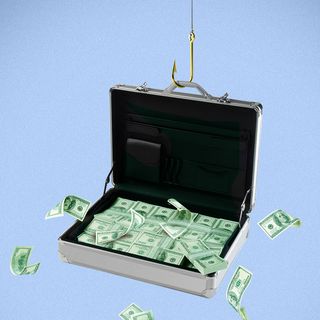Everyone is saying AI will reshape banking. A new report forecasts exactly how much.
Simon Dawson/REUTERS; Samantha Lee/Business Insider
- Banking could be "redefined" by as much as 40% by 2030, a new report predicts.
- The report says AI will fundamentally reshape many aspects of what banks do.
- It was prepared by ThoughtLinks, led by veteran banking exec Sumeet Chabria.
A new report attempts to put hard numbers on a question hanging over every Wall Street corner office: just how much of banking work will AI actually change?
Artificial intelligence is on track to redefine 44% of the work done at banks by 2030, according to ThoughtLinks, an independent consulting firm.
ThoughtLinks — which is led by founder and CEO Sumeet Chabria, a former tech and operations COO at Bank of America and a Wall Street veteran — mapped nearly 5,000 individual banking "processes" to see which roles or units at banks will experience the most upheaval in their roles.
Courtesy of Sumeet Chabria/ThoughtLinks
ThoughtLinks found that tech, engineering, and infrastructure—collectively considered one sector — would be most susceptible to transformation, with a projection of 55% of the work involved in that sector being redefined by 2030. It's a logical outcome, considering how many of the tasks in these fields are precisely the kinds that automation is best suited to handle.
Front office, client-facing sectors are hardly immune. Commercial banking could be redefined by as much as 49% by 2030, wealth management to the tune of 42%, and investment banking by as much as 33%, according to the report.
Courtesy of ThoughtLinks
Wall Street banks are investing heavily to compete. JPMorgan has deployed a large language model suite to its 200,000 employees, while Goldman Sachs has rolled out its own ChatGPT-like sidekick, GS AI Assistant. Citigroup also last week announced a new leadership team to drive AI strategy for its nearly quarter-million workers worldwide.
It's important to note that these numbers do not reflect ThoughtLinks' predictions about how many jobs could be lost or created as a result of AI — rather, they look at how much of the work done by those who work in banks could be done differently thanks to the implementation of artificial intelligence.
To assess how much each banking process could be redefined, ThoughtLinks developed a framework that maps what bank employees do to nearly 5,000 individual "processes." "'Redefined' reflects substantial AI-enabled, process-level change via automation, resequencing, elimination, or redesign," the firm wrote in its report.
In an interview, Chabria said that breaking finance jobs down to their most basic components would be critical to understanding how to retrain workers in the face of the AI revolution. "Clearly, you've got to keep the level of agility," he said, "because things are going to change."
Chabria shared three examples with Business Insider of how he anticipates sectors to respond to AI-driven changes. We got a look at snapshots for commercial banking, investment banking, and wealth management. Take a look at what's already transforming, what will be adapted by 2030, and the parts of the job that may stay mostly in the hands of humans for now.
Commercial banking: 49% redefined by 2030
What's already being automated:
- First-generation banking advisor copilot services are now live, helping bankers obtain insights on clients, quickly summarize notes or files, draft basic memos, or flag policy exceptions.
- Some manual workflows — like creating spreadsheets, drafting emails, and navigating legacy systems — are being replaced. This reduces time doing manual work, as well as human error.
- Customers have access to virtual AI-enabled assistants on corporate banking systems that give them personalized insights and enable them to do routine transactions more quickly.
What is expected to be redefined by 2030:
- Client onboarding: GenAI will help guide client onboarding conversations and tailor explanations, while the next iteration of AI will likely be able to verify forms and assess risks.
- Banks will leverage AI to assess small business creditworthiness to expand credit access.
- Banks will use AI to adjust loan pricing, fee structures, and product terms based on clients' behavior, financial patterns, and market conditions.
- AI tools will help detect some breaches and generate internal alerts in real time, increasing security 24/7.
What is likely to resist being redefined by AI:
- Large corporate lending will still require human credit judgment and board oversight.
- Banks will need to rely on legal, tax, risk, and structuring teams.
Investment Banking: 33% redefined by 2030
What's already being automated:
- Drafting documents like prospectuses or pitchbooks is being digitized. Generative AI tools can now pull in some market data, past deals, financial comps, and company-branded slides to build draft pitchbooks in minutes.
- Internal AI copilots are accelerating deal prep. Bankers can now use GPT-based tools to instantly summarize earnings calls, analyst reports, and client financials.
- Generative AI tools can now review documents, flag missing disclosures, and summarize new regulatory changes.
What is expected to be redefined by 2030:
- Banks will leverage AI to simulate investor demand or model pricing scenarios for equity and debt offerings. (Final allocation will remain human-led.)
- AI will help bankers test thousands of ways to structure a deal by adjusting debt, equity, pricing, and covenants to find the right balance for clients.
What is likely to resist being redefined by AI:
- Final IPO and syndicate pricing will remain human-led. Setting the price for a new issuance will require banker judgment, market feel, and live investor feedback.
- Winning mandates and advising the C-suite will remain relationship-driven and led by humans, who will use AI to enhance their knowledge or judgment and land new mandates.
Wealth Management: 42% redefined by 2030
What's already being automated:
- AI copilots can now answer questions, generate meeting prep docs, and summarize client portfolios — in seconds.
- Financial planning is faster and becoming more scalable. Tools powered by generative AI can aid advisors in building personalized plans that simulate life events, goals, and risk tolerance without starting from scratch.
- Client reporting is now becoming personalized with custom commentary on investment performance, market moves, and risk tailored to each client's portfolio.
What is expected to be redefined by 2030:
- Tax management will become more automated and timely.
- AI will help tailor advice and investment strategies to reflect individual preferences, financial behavior, and goals.
- On the flip side, clients may use AI to manage their wealth in their own portfolio with smart triggers.
What is likely to resist being redefined by AI:
- Client engagement and coaching will remain human. During market downturns or personal events, clients still want empathy, reassurance, and value judgment that only a trusted advisor can provide.
Regulators will ensure that advisors remain responsible for advice, not AI.
Have a tip? Contact this reporter via email at [email protected] or SMS/Signal at 561-247-5758. Use a personal email address and a nonwork device; here's our guide to sharing information securely.



